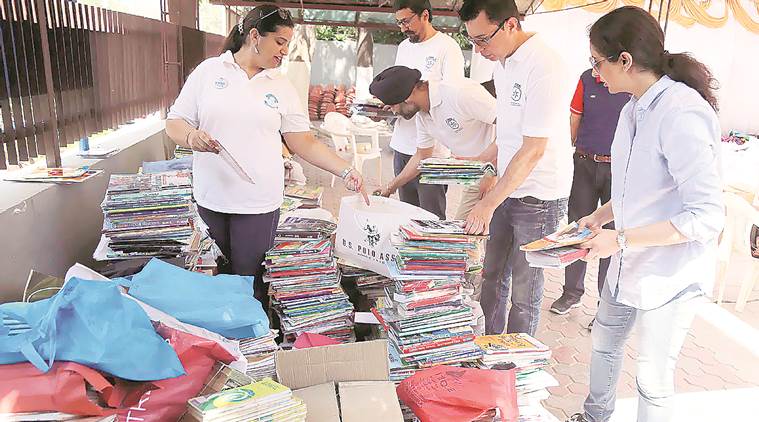 Members of Old Students Association of St. Kabir collect the material under the initiative ‘Kushiyon ka Recycle’ at St. Kabir School in Sector 26, Chandigarh, on Saturday. (Express Photo by Sahil Walia)
Members of Old Students Association of St. Kabir collect the material under the initiative ‘Kushiyon ka Recycle’ at St. Kabir School in Sector 26, Chandigarh, on Saturday. (Express Photo by Sahil Walia)
Written by: Akanksha Budhiraja
WITH THE new session all set to begin in the first week of April, the yearly ritual of getting rid of old books and buying new ones has started. This practice may seem exciting to students of all age groups, but there are many who cannot afford shiny, new books.
Under the Right to Education Act, free and compulsory education is a right of every student. The Act provides for free textbooks, money for uniform and free lunch under the midday meal scheme in all government schools up to Class 8, but despite the provisions, there are children who do not go to school and many who also drop out in between as they do not have the resources to get education.
In order to bring down these numbers, many organisations are doing their bit by coming together and collecting books, stationery and other material that might act as an incentive for students to go to school.
An NGO, headed by Pramod Sharma, has a ‘Kitab Ghar’ in Bapu Dham Colony, Chandigarh, which was established in 2008. Students can borrow or even issue books as per their needs from this library. Volunteers donate books and even promote reading campaigns, storytelling sessions and organise birthday parties for 500 marginalised children.
Pramod says they have a special centre in Bapu Dham Colony where 55 girls aged between 11 and 14 are provided extracurricular activities free of cost.
“We try and convince the parents of these girls to continue their education and since most of the schools in and around Bapu Dham Colony are Hindi medium, we help them polish their English and learn computers as well. That is something that helps most of them get a decent job after Class 12,” he adds.
The Chandigarh Parents Association also has a book bank that allows the exchange of second-hand books among students, but it did not take off as expected. President Nitin Goyal says, “It did not take off well. We got a decent response from donors but there were hardly any takers, so the project had to be shelved.”
“Schools use workbooks instead of textbooks. On top of that, there are some books that are updated or changed every year. These factors affect the number of takers,” he adds.
On March 24, an NGO called Goonj in association with KROS organised the second edition of ‘Khushiyon ka recycle’, a project that ensures learning for thousands of children in far-flung areas. In this drive, the organisation collected toys, games, books, chart paper, water bottles and uniforms that were in a usable condition.
Neena Singh, vice-president of KROS, says, “We got double the response from last year when we had only 40 gunny bags, but today we have 100. This is all because of our volunteers and donors who have shown such great interest.”